‘We partied with Tom Jones after’: When Wales denied England a Grand Slam at Wembley
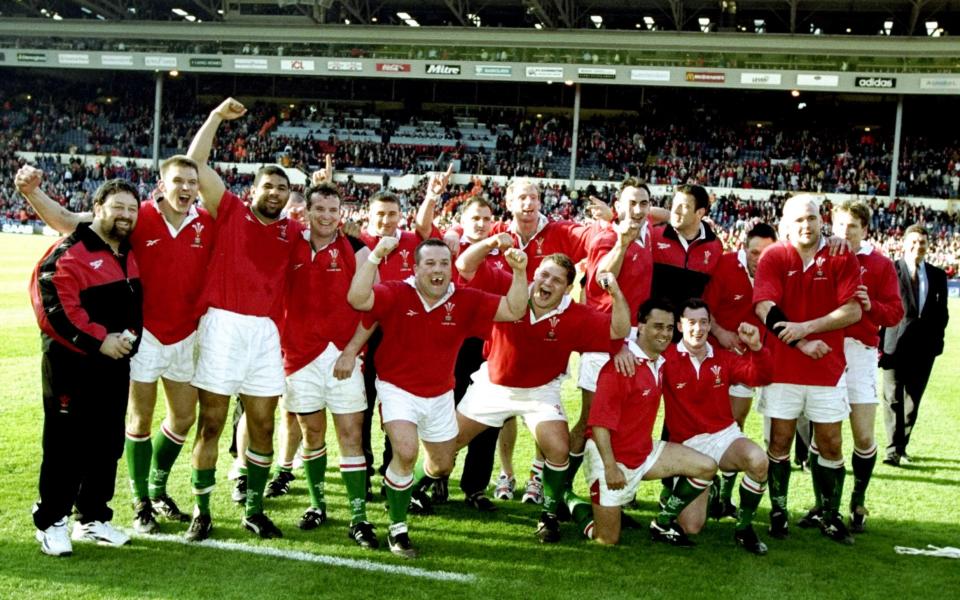
Twenty-five years ago, with the Millenium Stadium still under development, Wales were playing their home matches at Wembley. In the final Five Nations match, they were ‘hosting’ an England team hunting a Grand Slam, although a Welsh victory would give the title to Scotland. Even with a spectacular 34-33 win over France in their previous match, Graham Henry’s team were significant underdogs at the home of English football.
Here, some of the key players from that day relive their memories.
Matt Perry, England full-back: The old Wembley was an interesting stadium. The changing rooms were almost below ground level and you had to walk up this massive hill to get to the pitch and it was all Wales. Max Boyce was there singing and there were goats on the pitch. You just thought ‘oof, hang about, we are in England but this is a Wales home game’. I was lucky to have played in some amazing stadiums around the world but that was the most intense atmosphere I have experienced.
Dafydd James, Wales wing: There seemed to be celebrities everywhere. Tom Jones was in the players’ box speaking to all our wives and girlfriends. My parents were sat right next to Prince William and Harry. It was an extraordinary explosion of colour and noise, I just wished I had soaked it up more.
Colin Charvis, Wales flanker: As a forward when you were coming up against the England pack you just didn’t join in that carnival atmosphere. I know it happened, that Tom Jones, Max Boyce and Catatonia were there, but I just blocked a lot of it out.
James: Craig Quinnell had this ritual where he would hit the goalpost before every game. If I recollect, I think he broke his thumb when he did because Wembley had a different set of posts but there was no way anyone was pulling out of that game.
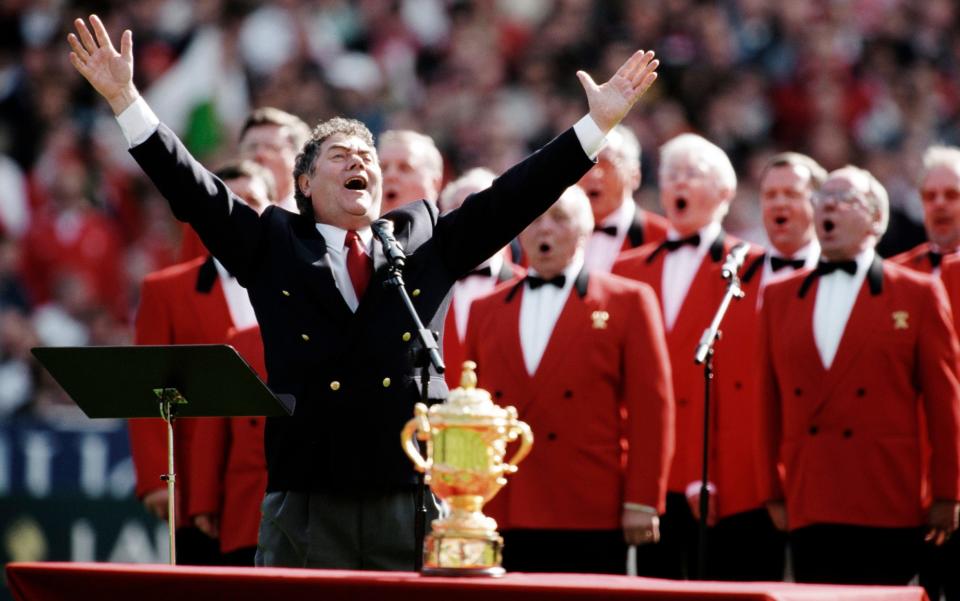
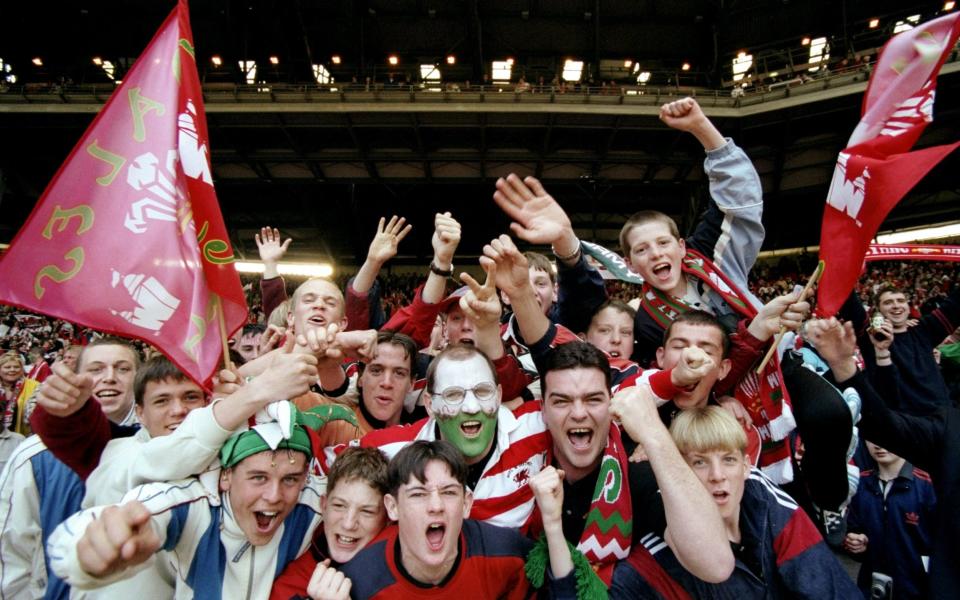
First half
Perry sets up Dan Luger for the opening try after just two minutes and Steve Hanley, the teenage wing, scores on his debut midway through the first half, but the boot of Neil Jenkins draws Wales level at 15-15. Just before half-time, Richard Hill seizes upon a collision between Gareth Thomas and Shane Howarth to score a try that puts 25-15 up but another Jenkins penalty, his sixth, ensures it is a one-score game going into the second half.
Charvis: The metaphor that has always been in my mind is of a heron with a frog half way down its throat and the frogs hands are squeezing the heron’s neck as it hangs on for dear life. It is just don’t give in, don’t let go. Neil Jenkins’s boot and a bit of resilience from the rest of the team, plus England not taking a couple of shots at goal, meant that we hung in there. We hung on to the heron’s neck until eventually it coughed us up.
Neil Back, England flanker: Hats off to them for remaining in the game, we never could pull away. We felt very confident in that game. We felt in control scoring three tries and Jonny was kicking points from everywhere but Jenks was too for Wales.
James: Neil was slotting goals from everywhere, which was important because I think it is fair to say that England played the better rugby and should really have been out of sight. Against the old enemy you have to believe in yourselves. It is a pride, it is more than just a game. Arguably it is our World Cup final every year. You have that never-say-die attitude. There were moments in that game where you just thought ‘crikey this isn’t going to be our day’ but Neil Jenkins kept us in it.
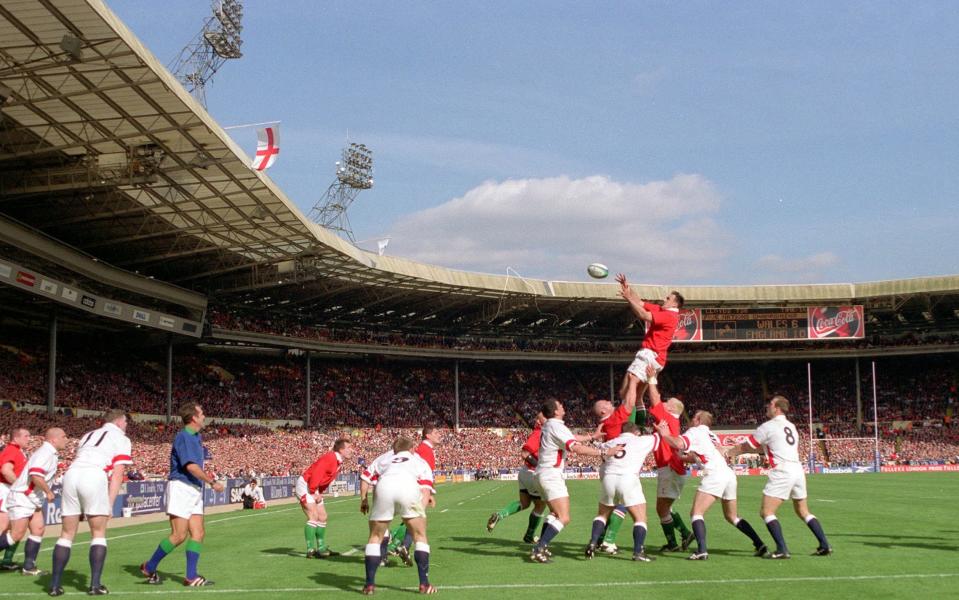
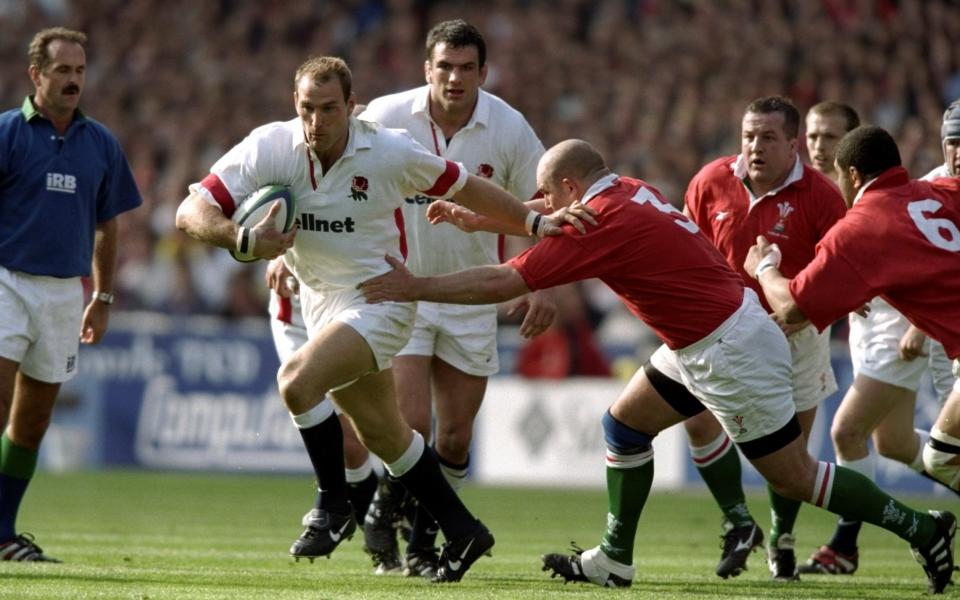
Second half
Howarth’s converted try brings Wales level but a pair of Wilkinson penalties gives England a 31-25 lead heading into the closing stages when they are awarded another penalty within kicking range. However, Lawrence Dallaglio opts to kick to the corner and Wales defend the driving maul.
Back: We learned a very important lesson with two minutes to go and being six points ahead, Jonny could have put the ball between the poles with either foot. That would have meant Wales having to score twice. We didn’t take that option and kicked to the corner and the line-out went wrong.
Charvis: I remember thinking good on them for taking the death or glory approach.
Perry: It is too easy to say we should have done this or done that, but there were a lot of errors in that last quarter. You know when you are rocking on the back foot as a team when you start making really uncharacteristic mistakes.
That Scott Gibbs try
The game is entering injury time when England back row Tim Rodber is penalised for a no-arms tackle on Charvis, allowing Jenkins to kick the penalty to the edge of the English 22.
Charvis: I had not been long knocked out for the penalty that led to the kick to touch. I am fairly sure I was still seeing stars at the line-out.
James: It probably would have been a red card these days. We discussed the move before we walked over to the line-out, Garin Jenkins’s quick throw to Chris Wyatt, straight down to Rob Howley and then use the foil of Scott Quinnell. No one thought he was going to pass the ball, but he gave this beautifully timed pass and Gibbsy was running the perfect line so he goes straight past Neil Back. He then started sidestepping which he rarely ever did.
Perry: I always backed myself one on one. I did a lot of work on my positioning to get the right angle and technique. But on that day there was no way I was stopping him. I tackled Jonah Lomu by one cuff but Gibbsy’s energy and forward momentum meant even if I caught his calf or even his bootlace there was no way I was stopping him. I tried but he bumped me into next week. As quite a few people remind me, I missed the tackle that cost England the Grand Slam.
Charvis: It is not very often in Test match rugby that you score first-phase tries. It just needs that bit of magic. All I can remember is chasing after his scurrying legs, thinking someone is going to tackle him and that I could make my career here if he offloads. But he scores and the first person with their arms wrapped around him screaming with joy is me.
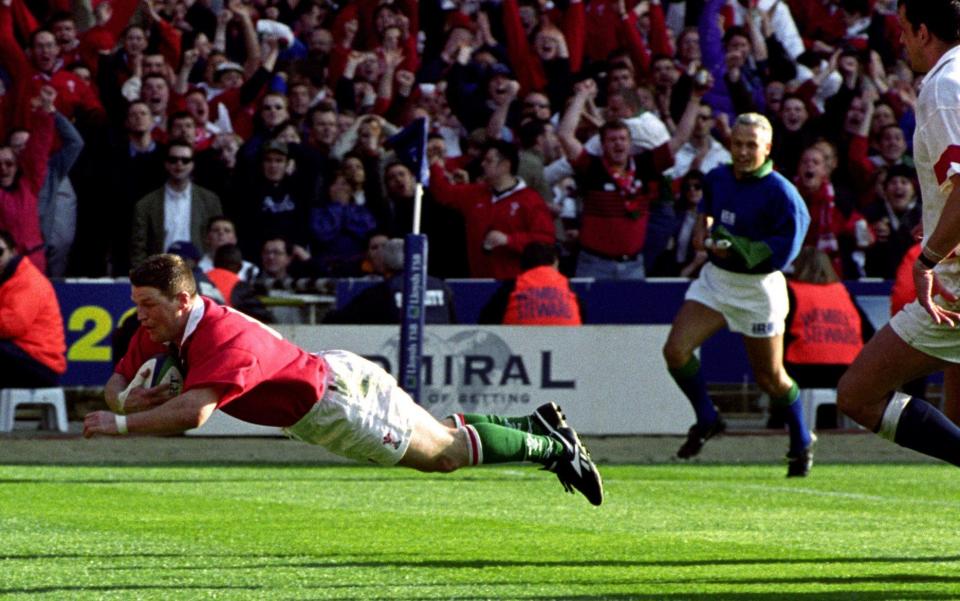
📍 Wembley Stadium
📅 11 / 4 / 1999
🏉 Scott Gibbs, take a bow
On this day in 1999! 😍 pic.twitter.com/hMQVVvbH9q— Guinness Men's Six Nations (@SixNationsRugby) April 11, 2019
Neil Jenkins’s conversion gives Wales a famous 32-31 victory, denying England the Grand Slam and hands the final Five Nations title to Scotland.
The aftermath
Charvis: I don’t know if it is true but there is an anecdote about Clive Woodward going up the stairs to collect the trophy and Graham Henry telling him to sit back down. Why let the truth get in the way of a good story?
Perry: One of my big memories was that no one in the England team was talking after the game. We walked down to our changing room, no one speaking. We got changed, still no one talking. We walked out towards the coach and there were these white van men pushing all these boxes of England Grand Slam T-shirts into the back of their vans. We were like sorry boys, you didn’t sell any today.
James: We stayed in London and there were a few Welsh celebrities in our afterparty like Cerys Matthews from Catatonia and Tom Jones. There were no mobile phones or cameras in those days which is probably just as well and we sang long into the night. The following week Scotland sent us all a bottle of Famous Grouse each which was a nice little touch from the Jocks.
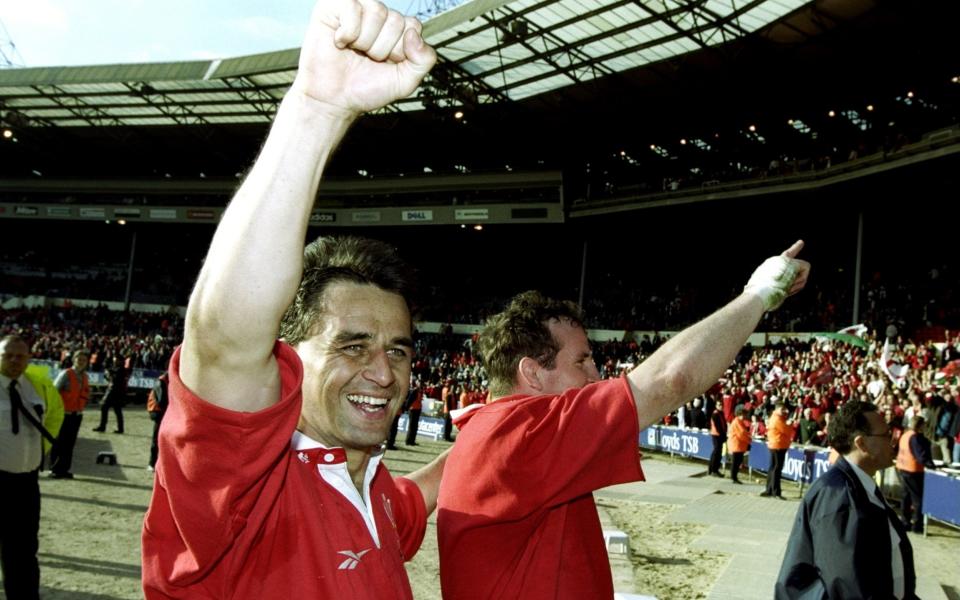
Charvis: The following day we left around 11 o’clock so we could nip over to the off licence to stock up for the bus journey. When we came back there were flags on all the bridges and there were thousands of people to greet us. It was such a glimmer of hope about how good we could be. We had a fairly mediocre tournament, but that was the start of a 10-match winning run for us. The supporters always believed in us, but that gave us something tangible for us to believe in ourselves.
Back: Although it was very painful, we give thanks to Wales for teaching us that lesson because in future games we took the three points and made the opposition chase us. The following year against Italy, I took that message on board about building the score and dropped a goal for England when we were only six points ahead. It was painful but we learned an important lesson that helped us four years later at the 2003 World Cup.
Perry: It was devastating but then the same thing happened in 2000 and 2001 (losing the Grand Slam) before they went on to win 2003. I just think it was a great spectacle for rugby as a sport. I have talked to a lot of Welsh people over the years and I have got Welsh ancestry myself and they call it a defining moment but in a sense it was a defining moment for both teams.

 Yahoo Sport
Yahoo Sport 






































